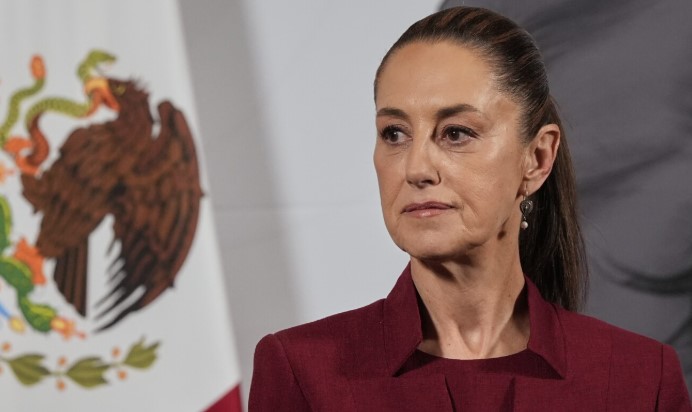Mexican President Claudia Sheinbaum once again made it clear that Mexico will not accept any kind of foreign military action on its soil. Speaking during her daily press conference on Friday, she strongly rejected the idea of U.S. airstrikes or military intervention against drug cartels inside Mexico.
Mexico Pushes Back Against U.S. Intervention Talk
She made these comments following an appearance with Fox News with Terry Cole, the administrator of the U.S. Drug Enforcement Administration (DEA). “U.S. President Donald Trump will ultimately decide whether to bomb Mexican cartels,” Cole stated in the interview. Additionally, he stated that the DEA would “support the mission and the orders that come down from the president.”
Sheinbaum firmly responded to these statements. “No foreign government has the right to infringe upon Mexico’s sovereignty as a free, independent, and sovereign nation,” she declared. She clarified that Mexico’s people and national values are what make the country strong.
The national anthem of Mexico served as another source of inspiration for her. “The nation would always be ready to defend itself if such a move was ever attempted,” she said, quoting a phrase. We have our national anthem, which declares that Mexico has a soldier in every one of its sons, in case there is an attempt, Sheinbaum said.
From Caracas to cartels — DEA chief accuses Maduro regime of fueling America’s drug epidemic
This is not the first time she has responded in this way. She has consistently pushed back against U.S. suggestions of taking direct military action on Mexican territory.
DEA’s Statements and Sheinbaum’s Response in Mexico
The debate intensified after Terry Cole’s comments. During his interview on August 21, Cole stressed that DEA agents have been fighting drug cartels for decades. He pointed out that they were “at war with these cartels for the past 40 years.” According to him, DEA personnel are always prepared to follow the president’s decisions.
In response, Sheinbaum emphasized that Mexico has its own laws and systems in place when it comes to security and cooperation with foreign agencies. She disclosed that U.S. Ambassador to Mexico Ronald Johnson had already had a conversation with Juan Ramón de la Fuente, Mexico’s Secretary of Foreign Affairs. She claimed that at the conclusion of that discussion, both countries agreed on the significance of “coordination and mutual communication” in combating organized crime.
U.S. Demands Mexican Banks Block Billions in Cartel Cash Hidden via Crypto and Trade
Sheinbaum clarified that U.S. agents, including DEA agents, must always seek approval from Mexico’s Foreign Affairs Ministry before operating in Mexico. Once approved, they must follow the nation’s National Security Law. Authorities may share information through the national intelligence and investigation system, but they do not go beyond that.
Her words highlighted that Mexico strictly limits and carefully controls cooperation with the United States under its own laws.
Disagreement Over DEA’s Project Potrero
This is also the second time in just one week that Sheinbaum has openly disagreed with the DEA. She refuted claims earlier in the week that Mexico and the CIA had inked a deal to combat the trafficking of synthetic drugs and target cartel “gatekeepers.”
She took direct aim at the issue on Tuesday. “An agreement with the DEA does not exist. We don’t know the basis for the release, but it was published. We did not reach any agreement,” she said.
Her remarks came shortly after the DEA announced what it described as a “major new initiative” to boost collaboration between Mexico and the United States. The program, called Project Potrero, was introduced as a flagship effort to dismantle cartel operatives who control key smuggling routes along the U.S.-Mexico border.
Maduro’s ties to terrorist organizations and drug cartels spark record $50 million reward from U.S
The discrepancy between Sheinbaum’s statements and the DEA’s announcement has drawn attention. Additionally, it follows Trump’s signing of an order that permits the use of military force against cartels. Sheinbaum had earlier dismissed that notion as “absolutely ruled out.”
By restating Mexico’s position, Sheinbaum has once more underlined her government’s stance: no military intervention by a foreign power will be allowed inside Mexico’s borders.
